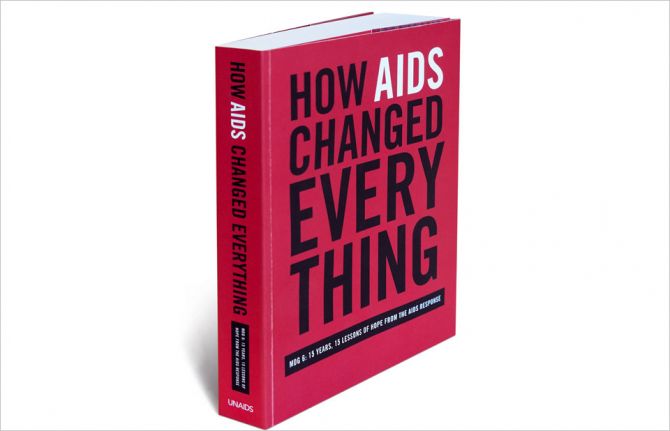

Feature Story
UNAIDS wins prize in the British Medical Association Book Awards for third time
07 September 2016
07 September 2016 07 September 2016For the second year in a row and for a third time, UNAIDS has been awarded prizes in the British Medical Association (BMA) Book Awards for its book How AIDS changed everything, which was runner up in the BMA President’s Choice Award and was Highly Commended in the Public Health category. A personal award from the BMA’s past President, Sir Al Aynsley Green, the President’s Choice Award is for the two books in the past year that most impressed him.
How AIDS changed everything—MDG 6: 15 years, 15 lessons of hope from the AIDS response is about how the world achieved and exceeded the AIDS targets of the Millennium Development Goals (MDGs) in 2015.
The book covers the 15 years of the MDGs and was launched in July 2015 as the world reached 15 million people on HIV treatment, a major milestone met ahead of schedule.
“The world has delivered on halting and reversing the AIDS epidemic,” said Ban Ki-moon, Secretary-General of the United Nations, at the launch. “Now we must commit to ending the AIDS epidemic as part of the Sustainable Development Goals.”
The BMA judges noted that, “This is an excellent book, written and presented to a high standard. It contains a comprehensive history of AIDS, its prevention and the suggested plans for the future.”
Michel Sidibé, UNAIDS Executive Director, said, “This award recognizes the achievements the AIDS response made under the Millennium Development Goals and the men and women who worked to help bring those achievements about.”
UNAIDS Director of Communications and Global Advocacy Annemarie Hou, accepting the award on behalf of UNAIDS, said, “The AIDS response brought the world together and this award is for all the people who are making a difference to end this epidemic.”
Major milestones met
Released in Addis Ababa, Ethiopia, on the sidelines of the Third International Conference on Financing for Development, the report demonstrates that the response to HIV has been one of the smartest investments in global health and development, generating measurable results for people and economies. It also shows that the world is on track to meet the investment target of US$ 22 billion for the AIDS response by 2015 and that concerted action over the next five years can end the AIDS epidemic by 2030.
How AIDS changed everything—MDG 6: 15 years, 15 lessons of hope from the AIDS response celebrates the milestone achievement of 15 million people on antiretroviral treatment—an accomplishment deemed impossible when the MDGs were set in 2000. It also looks at the incredible impact the AIDS response has had on people’s lives and livelihoods, on families, communities and economies, as well as the remarkable influence the AIDS response had on many of the other MDGs. The report includes specific lessons to take forward into the Sustainable Development Goals, as well as the urgent need to increase and front-load investments and streamline programmes.
Achieving MDG 6: halting and reversing the spread of HIV
In 2000, the world witnessed an extraordinary number of new HIV infections. Every day, 8500 people were becoming newly infected with the virus and 4300 people were dying of AIDS-related illnesses. How AIDS changed everything describes how, against all odds, huge rises in new HIV infections and AIDS-related deaths were halted and reversed.
Countries invested heavily in monitoring and evaluating their responses to HIV. In 2014, 92% of United Nations Member States reported HIV data to UNAIDS. State-of-the-art epidemic monitoring, data collection and reporting have made HIV data the most robust in the world, far more complete than data for any other disease. This has not only enabled the world to have a clear picture of HIV trends, it has also enabled HIV programming to be tailored to the specific dynamics of each country’s epidemic.
How AIDS changed everything—MDG 6: 15 years, 15 lessons of hope from the AIDS response is both a look back on the journey of the 15 years and a look forward to the future of the AIDS response and the path to ending the AIDS epidemic by 2030.
The flagship publication from UNAIDS was released at a community event at Zewditu Hospital in Addis Ababa on 14 July 2015 by United Nations Secretary-General Ban Ki-moon, the Ethiopian Minister of Health, Kesetebirhan Admassu, the Executive Director of UNAIDS, Michel Sidibé, and Abiyot Godana, Case Manager at the Entoto Health Center.
The prestigious awards were announced at a ceremony on 7 September 2016 at BMA House in London, United Kingdom. An annual event, the awards aim to encourage and reward excellence in medical publishing, with prizes given out in categories and an overall BMA Medical Book of the Year Award and a President’s Choice Award made from the shortlisted books.
